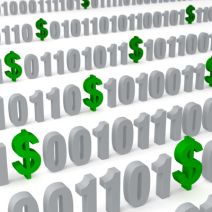RCL Systems Blog
Fact: USPS Makes $8 Million Per Year Selling Your Personal Data
 Unless you have been vigilant about covering your digital tracks, you’ve likely got your personal information floating all over cyberspace and it’s being used for who knows what. Most of this personal data is used for marketing purposes, but hackers like to get in on the data-collecting action too. Being aware of how your personal data is collected is the first step towards getting a handle on it.
Unless you have been vigilant about covering your digital tracks, you’ve likely got your personal information floating all over cyberspace and it’s being used for who knows what. Most of this personal data is used for marketing purposes, but hackers like to get in on the data-collecting action too. Being aware of how your personal data is collected is the first step towards getting a handle on it.
Forbes magazine provides us with some great insight as to what happens to your personal information once it’s posted online.
Computers Know You Better Than You Think
When it comes to marketing, no one can anticipate your needs quite like the shopkeeper at the corner market that you frequent. Because you come in almost every day, he knows how you like your coffee, as well as which periodicals you're interested in. This makes for a pleasant shopping experience, due in part because he will have all of your goods set aside for you. This is a rather old-fashioned way of doing business, and today, it’s been replaced and enhanced by the data-crunching power of computers.
A marketing world that’s driven by computers, collecting and crunching data was foreseen by Lester Wunderman, the “father of direct marketing.” Way back in 1967 a young Lester stated, “A computer can know and remember as much marketing detail about 200,000,000 customers as did the owner of a crossroads general store about his handful of customers.”
Today, all it takes is just a few pieces of your personal information to be run through a computer marketing algorithm in order to produce a frighteningly accurate profile that anticipates a consumer’s needs, much to the chagrin of kindly shopkeepers the world over. Your profile can include personal information about such things as your religion, political loyalties, marital status, sexual orientation, along with other personal details about your life that you would perhaps never divulge to someone like a random cashier or even a trusted friend.
Don’t Underestimate the Value of Your Zip Code
Your zip code is one example of how a seemingly innocent piece of personal data can be quite valuable to a marketer. In fact, according to Harvard professor Latanya Sweeney, once a marketing institution is able to associate your name and date of birth with your zip code, there’s an 87 percent chance that the marketing company can not only identify you, but also place you on some very accurate lists for future campaigns.
In fact, the United States Postal Service fully understands the value of basic personal information like your name and zip code, which is why they regularly sell this information to marketers whenever the information is updated. According to Forbes, selling customer information like this generates around $8 million per year for the USPS.
Facebook: Where Marketing Magic Happens
Of course, knowledgeable shopkeepers and the USPS don’t even come close to what happens to your personal data that you’ve willingly made available over the Internet, with social media platforms like Facebook taking the virtual cake. Essentially, the more transparent you are on Facebook by doing things like tagging yourself in photos, “liking” pages and posts, and other normal Facebooky activities, the more in depth your marketing profile becomes, making your data even more valuable to marketing institutions. Every wonder why social media platforms like Facebook are free to use? It turns out that they’re making money off you whether you boost your post or not.
In fact, even if you minimally post and interact with the content on Facebook, Facebook can still generate enough personal information about you to create a profile that’s valuable to marketers, just by connecting the dots with the likes and interests of your friends. This is why many of the advertisements you see on Facebook will try to get you to click on it by saying “so-and-so friend likes this product.”
Despite objections from some segments of society, this practice of selling personal data is perfectly legal. In fact, you’re likely a willing player in this whole marketing game thanks to that giant box of text that you “read” when signing up for your favorite online service (the I-understand-the-terms-and-conditions-of-using-this-service box which makes us all out to be a bunch of liars). However, for every online marketer that wants your personal data for good, there seems to be a hacker who wants to illegally obtain your data for nefarious purposes. This is why you and your employees need to be mindful of data-sharing best practices when using the Internet, especially when it pertains to sensitive corporate information.
To equip your business with solutions that will protect your company’s data from hackers, like RCL Systems’s Unified Threat Management tool, and for help implementing browsing best practices so that you’re not sharing more information than what you’re comfortable with, call RCL Systems at (281) 240-2777.
When you subscribe to the blog, we will send you an e-mail when there are new updates on the site so you wouldn't miss them.

Comments